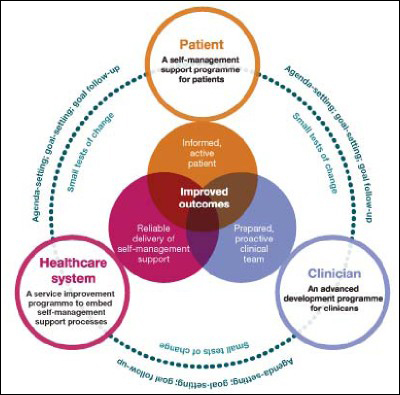A model for self-management support
Co-creating Health enables clinicians and patients to make their interactions as productive as possible. It not only provides training on how to have collaborative partnerships, it also builds the required processes – joint agenda-setting,goal-setting and goal follow-up – into the delivery of clinical care. We call these three processes the 'enablers’ and are at the heart of Co-creating Health (see below).

The ‘enablers’
Agenda setting
The first enabler supports patients and clinicians to jointly agree the aims of each meeting they have. The evidence shows that when this does not happen effectively, patients feel dissatisfied with their experience. In addition, they are less likely to become ‘active patients’ and adhere to treatment advice, act on the lifestyle change advice or even attend their next appointment. Establishing the patient’s perspective at the start helps clinicians to work with the patient’s own motivations and interests and improves both patient experience and outcome.
Goal setting
The evidence shows that the most effective way for someone with a long-term condition to begin to make health-improving changes is by choosing their own small and achievable goals. These goals do not need to be clinical in nature – but achieving them must be important to the patient and something they will be proud of. Achieving these goals builds confidence and momentum. For people with long-term conditions, this is the first step towards building effective self-management skills and specifically, the all-important belief that they can make a difference to their health (known by health psychologists as ‘self-efficacy’). Co-creating Health supports teams to develop health services in which setting such goals is a core part of patient–clinician interactions, fully supported by the system.
Goal follow-up
For all of us, the ability to keep up health-improving changes diminishes without regular reinforcement. Our existing health system is poorly designed to do this. Proactive ‘follow-up’ by the health service fairly soon after a goal has been collaboratively agreed is needed to provide encouragement, advice and support. This marks a radical departure from our current system of contact between healthcare professionals and patients.
Last updated13 Oct 2008

